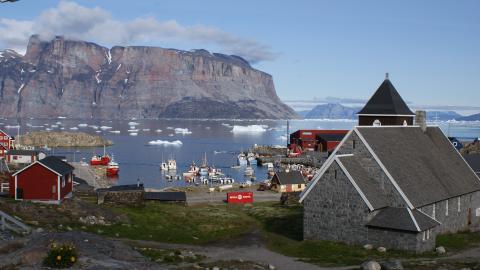
Climate and environmental upheaval: responses of non-Western communities to signs of human extinction
What if the more global future of humanity in the light of the predicted two-fold environmental and climatic crisis could be studied through the prism of the disturbances suffered by non-Western communities and their responses? This is the goal of the PREFER project (Deciphering the lay ethics of terminal risks: local terminal risks as proxies for existential risks), led by Jean-Paul Vanderlinden from the Cultures, Environments, Arctic, Representations, Climate Laboratory (CEARC - Univ. Paris-Saclay, UVSQ).
It is an unfortunate fact that many communities around the world are on the verge of disappearing due to environmental and climatic deregulation. For the majority of these communities, the community bond stems from sharing the same land. However, the surface area of land dried out or submerged by the sea is constantly increasing, and the present or future disruption that this entails for these communities is irreversible for many.
With the PREFER project, winner of an ERC Advanced Grant 2021, Jean-Paul Vanderlinden, a researcher in environmental studies and ecological economics at the CEARC laboratory, calls for a radical approach to these upheavals. He proposes studying them at the level of the communities chosen as archetypal and transposing the results of this study to the upheavals undergone on a larger scale, that of all humanity. We then talk about existential risks, which involve the collapses of vital ecosystems, that is to say everything that constitutes the existence of a set of living beings. Environmental or climatic crises are therefore potential causes of extreme upheavals, possibly too significant for us to able to adapt or rebound.
The project, which starts in October 2022 and will last five years, brings together scientists from CEARC, the Laboratory for Sciences of Climate and Environment (LSCE - Univ. Paris-Saclay, CNRS, CEA, UVSQ), local universities, and various local partners. The project originally included six study communities: three in the Mekong Delta (Vietnam) and three in the Arctic, including one in Greenland and two in Russia. With the current conflict in Ukraine preventing access to Russian communities, there are now plans to use two new communities located in Colombia.
Going beyond the injunction to resilience
Prior to the project, the CEARC researcher identified three major problems with this work. The first is that climate or environmental change often results in an injunction for non-Western communities to adapt to change and be resilient. Resilience is the ability of an individual or group to cope with and recover from a shock (whether social, economic, environmental, pandemic, military, etc.). This resilience to shocks is necessary for the survival and sustainability of communities. But there are contexts of change where the required adaptation is far too violent and resilience is simply not possible. The question then becomes how to distance ourselves from this injunction in contexts where it is not adapted to certain communities.
Putting local knowledge at the heart of the analysis
This first difficulty leads to a second, that of mobilising local knowledge. To escape from the dominant injunctions, the word of the communities must be placed at the heart of the analysis. The interviewer's opinion differs from that of the respondent. According to Jean-Paul Vanderlinden, the western researcher has a predominant material vision, while non-western communities mostly have a hybrid material and non-material vision. They even claim it and set it against the supposed Western materiality. To understand the full extent of a community's experience, we must therefore look through their eyes.
Documenting the ‘small ends of humanity’
It is a fact that current and future climatic and environmental disruptions put the survival of a large number of communities at stake. For the CEARC researcher, these are all 'small ends of humanity'. Successfully documenting these situations provides a toolbox for preparing more globally for future extreme shocks.
This last difficulty is at the heart of the PREFER project. 'Local terminal risks' are very significant and even irreversible risks for the survival of a community. Their study helps to understand the mechanisms at work if an extreme shock occurs elsewhere or on a global scale; the PREFER project is specifically interested in the risks of the collapse of vital ecosystems.
The weight of stories
The method used by the PREFER project is based on the Interview - Observation - Research/Action triptych. It is also part of CEARC's activities. The challenge is to collect the stories of individuals, to listen to their stories. The observation of community practices then supplements these interviews, because the 'small ends of humanity' are always different depending on the context. Therefore, research is never detached from the need to bring solutions to communities. A response must be proposed to and in collaboration with them.
Starting with a collection of individual stories, the researchers will organise group interviews to obtain collective accounts. One of the aims of the project is also to produce artistic works, like the documentary Voices from Uummannaq, created from stories collected by CEARC scientists during previous works. Combining images and monologues, it presents the practices, desires, fears and doubts of the inhabitants of this island of Greenland. "It is in the stories that the strength of the people lies. At the heart of what makes the future of a community, there are stories," concludes Jean-Paul Vanderlinden.
References:
- C. da Cunha, I. Nikulkina, JP. Vanderlinden, V. Shadrin, N. Doloisio, D. Salakhova. Adaptative capacity for climate change : local initiatives and federal planning. The case of Tiksi, Sakha Republic, Russia. Polar Science, Volume 31, 2022, 100761, ISSN 1873-9652.
- J.-P. Vanderlinden, E. Rouhaud, N. Touili. Knowledge and legitimacy, an ethical framework-based analysis of coastal flooding risks in a changing climate and associated narraties. Frontiers in Climate, 4, 2022.
